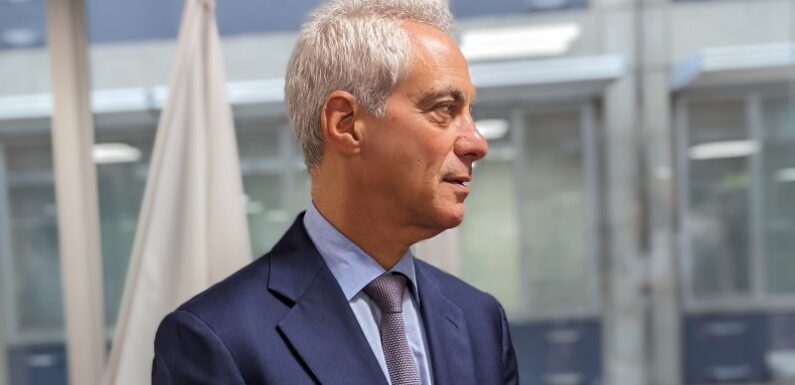
Save articles for later
Add articles to your saved list and come back to them any time.
Tokyo: A top US diplomat known for his outspoken commentary on China’s leadership said all countries wanting to deter Beijing from its aggressive behaviour need to do more to boost their defence forces.
US Ambassador to Japan Rahm Emanuel declined to say whether Tokyo should have any role in future AUKUS programs and would not go near questions about whether Japan should also be switching from diesel-electric to nuclear submarines to deter threats from China, North Korea and Russia.
US Ambassador to Japan, Rahm Emanuel.Credit: Latika Bourke
But asked by The Sydney Morning Herald and The Age if Japan was ready in the event China made a move against Taiwan, Emanuel said all countries needed to do more.
“There’s more for all of us to do,” Barack Obama’s former chief of staff said.
“That’s one of the lessons we’ve learned … all of us have a lot to do and all of us are involved in real-time doing what we need to do to bring our game up.
“It’s not for me to discuss AUKUS,” he said. “That’s for a higher level.”
Emanuel reportedly infuriated China’s leadership last week with a series of tweets that drew parallels between the mystery of missing Chinese ministers and whodunit novels by Agatha Christie.
Emanuel was speaking to the National Graduate Institute for Policy Studies in Tokyo, Japan, when he gave an address outlining how the three “Cs” of the last four years – COVID, conflict and coercion – were defining the geopolitical landscape.
He singled out China’s coercion of Australia and Japan as examples of how Beijing used a range of its powers as the world’s second-largest economy to try and deprive countries of their political agency.
In early 2020, China slapped Australian wine, coal and barley with huge tariffs after former prime minister Scott Morrison called for a COVID inquiry. Beijing faced losing a case launched by Australia in the World Trade Organisation and lifted its taxes on barley, but the extra charges on Australian wine remain in place.
In September 2021, Morrison announced the AUKUS plan for Australia to acquire nuclear-propelled submarines in partnership with the US and UK.
Nobou Tanaka, a former director of the International Energy Agency, said nuclear-propelled submarines would be the most strategic deterrence against North Korea, China and Russia for Japan, and asked Emanuel for his own views in a question and answer session after the ambassador’s speech.
“I’m not touching that with a 10-foot pole – that’s my view on that,” Emanuel said to Tanaka. “If you want to talk to the Japanese government about nuclear subs, I can give you a phone number.”
“I think Emanuel was not negative about nuclear sub co-operation with Japan. He meant it is up to the Japanese government,” Tanaka told this masthead.
“When Japan deploys Tomahawk missiles, we will need nuclear submarines, but the Ministry of Defence is cautious due to the public image of nuclear power and very high costs of nuclear sub and its personnel.
“We must now publicly discuss the role of nuclear power for national defence. Of course we should not have nuclear weapons, but nuclear-propulsion subs with regular Tomahawks may add important deterrence for Japan against North Korea, China and Russia together with the US nuclear umbrella.”
Emanuel praised Prime Minister Fumio Kishida’s decision to raise Japan’s defence spending to two per cent of GDP. Kishida has previously warned that the unprovoked war in Ukraine could be replicated in the Indo-Pacific.
After an NBC report claiming he’d been asked to rein in his provocative posts taunting China, the latest of which likened the disappearance of China’s defence minister to a plot line from an Agatha Christie novel, Emanuel doubled down, releasing new photographs which he said were Chinese vessels fishing in Japan’s waters – the same area from where Beijing has blocked Japanese seafood imports.
China claims the fish are contaminated by Japan’s recent release of treated wastewater from the 2011 Fukushima nuclear disaster, which the International Atomic Energy Agency has said is safe.
“If the fish and the concern about the fish is a public health area, why is China still fishing in Japan’s waters? That’s the question,” he said.
“I do appreciate the attention on me, but let’s not lose our perspective on the bigger picture – you have a defence minister who [has gone missing] about a month after the foreign minister’s gone missing.”
Get a note directly from our foreign correspondents on what’s making headlines around the world. Sign up for the weekly What in the World newsletter here.
Most Viewed in World
From our partners
Source: Read Full Article
